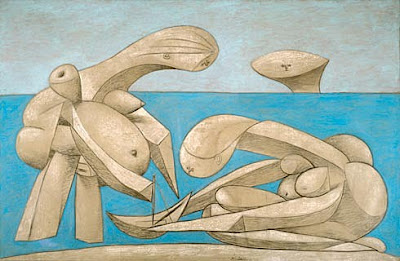 |
| Niccolò Cecconi Pompeian Bath ca. 1890 oil on canvas Art Gallery of New South Wales, Sydney |
 |
| Pablo Picasso Three Bathers 1920 oil, pastel and graphite on paper Guggenheim Museum, New York |
 |
| Pablo Picasso Bathers with Ball 1928 oil on canvas Moderna Museet, Stockholm |
 |
| Pablo Picasso On the Beach 1937 oil, crayon and chalk on canvas Peggy Guggenheim Collection, Venice |
 |
| Robert Riggs Pool ca. 1933 lithograph Smithsonian American Art Museum, Washington DC |
 |
| Elizabeth Olds Dead End Beach ca. 1940-45 screenprint Smithsonian American Art Museum, Washington DC |
 |
| Sid Grossman Coney Island ca. 1947-48 gelatin silver print Whitney Museum of American Art, New York |
 |
| Reginald Marsh Coney Island Beach 1948 drawing Smithsonian American Art Museum, Washington DC |
 |
| Larry Silver Headstand, Muscle Beach, Santa Monica, Calif. 1954 gelatin silver print Whitney Museum of American Art, New York |
 |
| Leon Levinstein Coney Island ca. 1955 gelatin silver print Art Institute of Chicago |
 |
| Robert Andrew Parker Some People at the Beach ca. 1955 watercolor on paper North Carolina Museum of Art, Raleigh |
 |
| David Park Four Men 1958 oil on canvas Whitney Museum of American Art, New York |
 |
| Tina Barney Untitled 1991 C-print Whitney Museum of American Art, New York |
-The-Parade-2006-2007-oil-on-linen-Hall-Collection-Schloss-Derneburg-Germany.jpg) |
| Eric Fischl Scenes from Late Paradise: The Parade 2006-2007 oil on linen Hall Collection, Schloss Derneburg, Germany |
 |
| Chase Hall The Ocean's Floor 2021 acrylic paint and coffee on canvas Whitney Museum of American Art, New York |
Grace
We were taught, in those years,
never to speak of good fortune.
To not speak, to not feel –
it was the smallest step for a child
of any imagination.
And yet an exception was made
for the language of faith;
we were trained in the rudiments of this language
as a precaution.
Not to speak swaggeringly in the world
but to speak in homage, abjectly, privately –
And if one lacked faith?
If one believed, even in childhood, only in chance –
such powerful words they used, our teachers!
Disgrace, punishment: many of us
preferred to remain mute, even in the presence of the divine.
Ours were the voices raised in lament
against the cruel vicissitudes.
Ours were the dark libraries, the treatises
on affliction. In the dark, we recognized one another;
we saw. each in the other's gaze,
experience never manifested as speech.
The miraculous, the sublime, the undeserved;
the relief merely of waking once more in the morning –
only now, with old age nearly beginning,
do we dare to speak of such things, or confess, with gusto,
even to the smallest joy. Their disappearance
approaches, in any case: ours are the lives
this knowledge enters as a gift.
– Louise Glück (2001)
